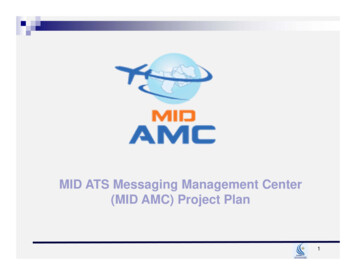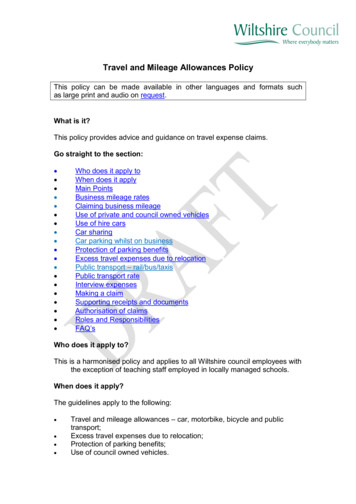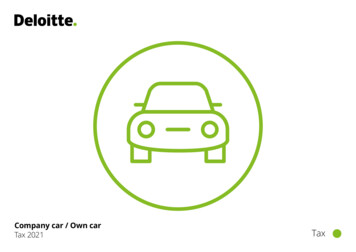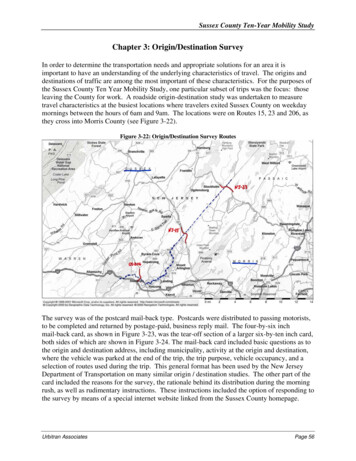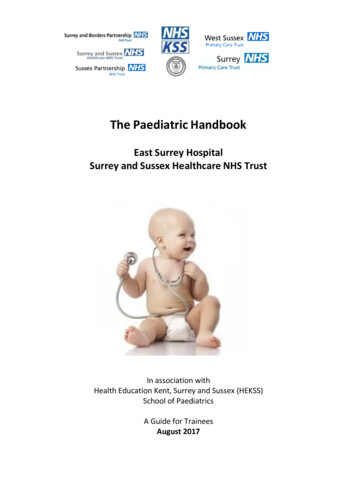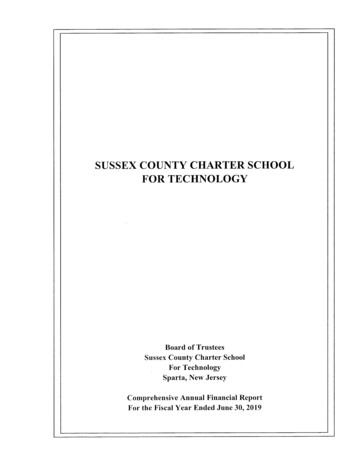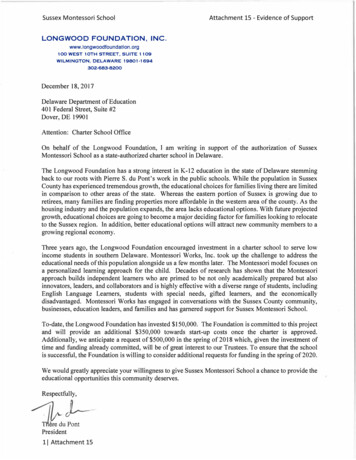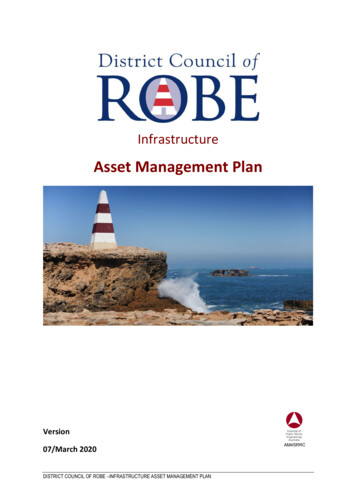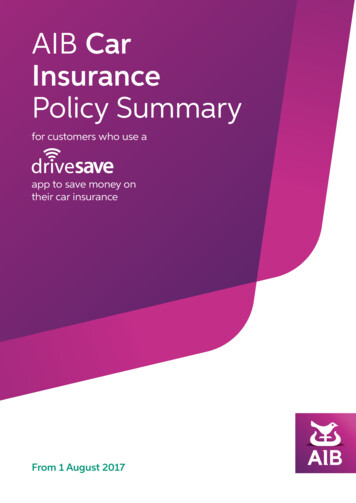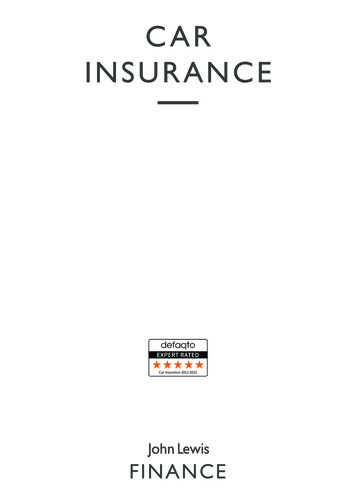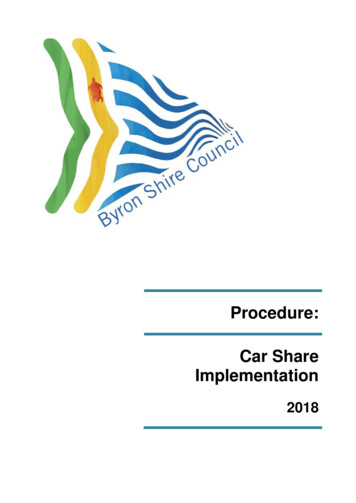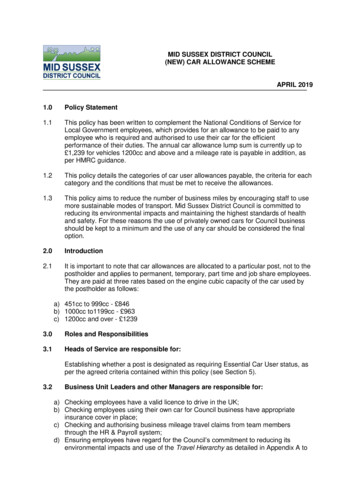
Transcription
MID SUSSEX DISTRICT COUNCIL(NEW) CAR ALLOWANCE SCHEMEAPRIL 20191.0Policy Statement1.1This policy has been written to complement the National Conditions of Service forLocal Government employees, which provides for an allowance to be paid to anyemployee who is required and authorised to use their car for the efficientperformance of their duties. The annual car allowance lump sum is currently up to 1,239 for vehicles 1200cc and above and a mileage rate is payable in addition, asper HMRC guidance.1.2This policy details the categories of car user allowances payable, the criteria for eachcategory and the conditions that must be met to receive the allowances.1.3This policy aims to reduce the number of business miles by encouraging staff to usemore sustainable modes of transport. Mid Sussex District Council is committed toreducing its environmental impacts and maintaining the highest standards of healthand safety. For these reasons the use of privately owned cars for Council businessshould be kept to a minimum and the use of any car should be considered the finaloption.2.0Introduction2.1It is important to note that car allowances are allocated to a particular post, not to thepostholder and applies to permanent, temporary, part time and job share employees.They are paid at three rates based on the engine cubic capacity of the car used bythe postholder as follows:a) 451cc to 999cc - 846b) 1000cc to1199cc - 963c) 1200cc and over - 12393.0Roles and Responsibilities3.1Heads of Service are responsible for:Establishing whether a post is designated as requiring Essential Car User status, asper the agreed criteria contained within this policy (see Section 5).3.2Business Unit Leaders and other Managers are responsible for:a) Checking employees have a valid licence to drive in the UK;b) Checking employees using their own car for Council business have appropriateinsurance cover in place;c) Checking and authorising business mileage travel claims from team membersthrough the HR & Payroll system;d) Ensuring employees have regard for the Council’s commitment to reducing itsenvironmental impacts and use of the Travel Hierarchy as detailed in Appendix A to
select the most appropriate means of conducting Council business so that the use ofa private motor vehicle is always the last resort.3.3Employees are responsible for:a) Ensuring they have a valid driving licence for driving in the UK;b) Accurate and timely submission of mileage claims through the HR & Payroll system;c) Ensuring they have the necessary insurance cover for making a business journey intheir own car. Copies of a valid Certificate of Insurance must be presented to the HRDepartment for inclusion in the officer’s confidential Personnel file;d) Having regard for the Council’s commitment to reducing its environmental impactsand use of the Travel Hierarchy as detailed in Appendix A to select the mostappropriate means of conducting Council business so that the use of a private motorvehicle is always the last resort.4.0Casual Car User Status4.1It is acknowledged that for some employees there is the occasional need to haveaccess to a motor vehicle to carry out their duties, there not being the requirement forimmediacy of access to a vehicle as in the case of an essential user. Therequirement is more likely to be on a time-to-time and/or planned basis. Unless thepattern of use meets the essential user category, the employee will be classified as acasual car user.4.2Casual users will be entitled to claim mileage applicable, as per HMRC guidance4.3Casual users are required to consider alternative options to the use of a privatevehicle and to have regard for the Travel Hierarchy.5.0Essential Car User Status5.1The decision to designate a post as requiring Essential Car User status rests with theHead of Service, in conjunction with Human Resources.5.2The post should be demonstrated to be one where the duties are of such a naturethat it is essential for the postholder to have a motor vehicle available wheneverrequired. In other words, there must be a fundamental requirement for the postholderto have regular and immediate access to a motor vehicle to carry out theresponsibilities of the post. This requirement is often likely to be on an unplannedbasis.5.3The criteria for allocation of an Essential Car User Allowance are:a)b)c)d)Annual business mileage at least 250 miles per annum andRegular (weekly) use at short notice orRegular (weekly) transport of passengers or bulky materials/equipment orRegular (weekly) significant journeys for which public transport would be impracticalore) Regular visits to many sites where the use of a private vehicle is essential to carryingout the duties in the job description.Please note that the qualifying minimum mileage of 250 miles to obtain an essentialuser lump sum payment is a locally agreed threshold, and therefore subject to reviewon an annual basis by the Head of Digital & Customer Services in conjunction with
Management Team. Given the Council’s commitment to reducing CO2 emissions thisthreshold will be considered carefully in future years.5.4However, due to the diverse nature of the services provided by the Council, it isrecognised that the above criteria may not be the only factors to be considered. Forexample, posts that provide emergency cover requiring transport to be immediatelyavailable, or posts that provide services out of hours when public transport may notbe an option.5.5When taking a decision to designate a post as requiring essential car user status,Heads of Service must take account of the Council’s commitment to reducing itsenvironmental impacts and ensure that the classification of the post as requiringessential car user status is appropriate and that the Travel Hierarchy (Appendix Arefers) is used to establish the most suitable means of undertaking Council business.5.6Where a post carrying essential car user status becomes vacant, the Head of Servicemust review the requirement. For posts where the annual business mileage has beenbelow 250 miles per annum, the assumption will be that the essential user status willbe removed unless the Head of Service can specify why the requirement remainsand obtain approval from the Assistant Chief Executive or Chief Executive.5.7Where the post is new, the manager must obtain the appropriate authorisation fromthe Head of Service, in conjunction with Human Resources, for designating the postas requiring essential car user allowance, before the recruitment process isundertaken.5.8Where a post attracts essential car user status, the postholder will receive a lumpsum allowance per annum and mileage rate in accordance with HMRC guidance.5.9Those authorised as essential users will be advised that the award is for a period notto exceed one year at which point it will be reviewed by the Head of Service inconjunction with Human Resources. Annual reviews applying the criteria as stated inpara 5.3 will ensure that the number of essential car users are kept to a minimum ofnamed drivers.5.10A period of three months’ notice to terminate the status and associated allowance willbe given to any employee who no longer meets the required criteria, as detailed inpara 5.3.6.0Payment Procedure6.1Payment of the lump sum and allowance for official mileage will be included withinthe Officer’s monthly salary payment. Claims must be submitted and authorised viathe HR & Payroll system by the first working day of the month and must include thepreceding month’s official mileage undertaken between the set dates determined.Claims must not be submitted more than 2 months in arrears.6.2The lump sum part of the allowance will be liable for Income Tax and NationalInsurance. Income Tax and National Insurance will be deducted at source.All officers undertaking journeys on Council business are required to use the shortestpracticable route, to avoid multiple journeys and to submit their claims on this basis.6.36.4The lump sum car allowance is non-pensionable. Both full and part-time staff receivethe full NJC car allowance – it is NOT pro-rata’d for part time staff.
7.0HM Revenue & Customs (HMRC) implications7.1By staff submitting a claim form the employer has written evidence and an audit trailof all journeys made by staff receiving a car allowance and monies paid out forbusiness mileage.7.2The HMRC approved amount for mileage allowance payments are as follows:Mode of transportCar or vanMotorbikeBicycleBusiness miles coveredFirst 10,000 miles;thereafterAllAllRate per mile45p20p24p20p7.3Whilst staff may decide not to make a claim for mileage expenses, it is a requirementof the Scheme that a monthly record of miles undertaken to carry out workresponsibilities, for Mid Sussex DC monitoring and HMRC audit purposes, issubmitted via the HR & Payroll system for recording. The recording of mileageinformation will be reviewed by the Payroll Manager and any non-compliance byofficers in receipt of a car allowance will be reported to Heads of Service forappropriate action to be taken.7.4It is a requirement that all essential car users receiving a lump sum payment submitup to date mileage information, on a monthly basis, so that the Payroll Manager isable to process correct information to the HMRC at year end.7.5Failure by eligible officers to comply with the requirement to regularly submit up todate mileage information may forfeit the officer’s continued eligibility to receive thelump sum car allowance.8.0Car Sharing – ‘passenger supplement’8.1Staff are encouraged to car share when undertaking Council business and inparticular when attending the same meetings. To encourage this element of thepolicy, staff who share their motor vehicle with Mid Sussex employed colleagues toundertake Council duties will be eligible to claim a ‘passenger supplement’. Anadditional 5p per mile can be claimed for passengers, whatever the number. TheHMRC allow a passenger supplement of up to 5p per mile as tax and NI exempt inaddition to the usual 45p approved limit for cars.8.2Staff claiming the ‘passenger supplement’ will be required to detail passengernumbers and names and record this information when submitting claims to thePayroll Manager.8.3Staff would need to demonstrate that their insurance policy covers them to transportcolleagues for work purposes and that on an annual basis; they provide evidence ofa valid driving licence and certificate of motor insurance. This evidence should bepresented to the HR Department for recording purposes.9.0Travel Direct between Home and Alternative Work Place, First or Last Visit9.1Employees who submit claims for vehicle allowances, who are making their first callof the day (outside their normal workplace) direct from home or returning direct to
home from their last call of the day, are entitled to claim any excess mileage abovetheir usual home to workplace to workplace to home journey. Employees must neverclaim anything for their normal home to office journey.10.0Travel to Training Courses10.1Car mileage undertaken in connection with travel to approved training events will bepaid at 22p per mile plus 1p extra for every additional passenger.11.0Road Traffic Fines11.1Any road traffic and parking fines incurred by a Council employee while engaged onofficial and authorised Council business will need to be paid by the employee. If theemployee believes there are exceptional circumstances surrounding their particularcase, they need to speak to their line manager in the first instance, who should seekadvice from Human Resources.
Appendix A
lump sum car allowance. 8.0 Car Sharing - 'passenger supplement' 8.1 Staff are encouraged to car share when undertaking Council business and in particular when attending the same meetings. To encourage this element of the policy, staff who share their motor vehicle with Mid Sussex employed colleagues to
